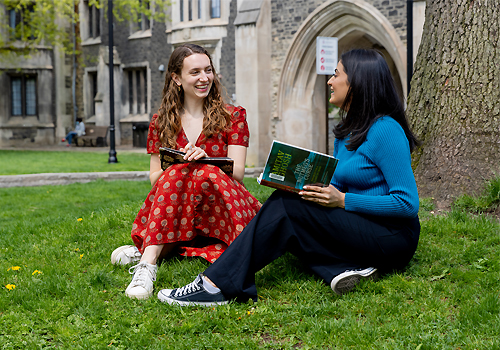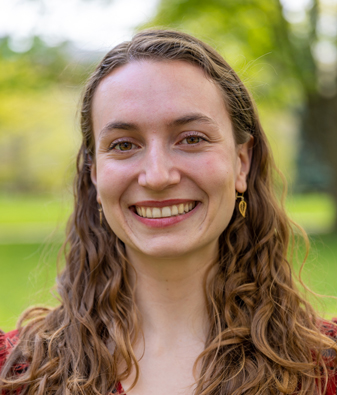From severe storms that hit with frightening frequency to increased health risks to mass poverty and displacement, the effects of the climate crisis can't be overlooked.
Though the situation seems dire, there is hope. The inaugural Master of Environment & Sustainability (MES) class at the School of the Environment is developing the leadership skills needed to lead us out of this crisis. These emerging leaders are acquiring critical skills, knowledge and perspectives by delving into environmental decision making, law and global climate politics in classes taught by leading experts and using multidisciplinary approaches to study the environment and human well-being challenges.
Fighting for a better future
As they enter the final months of their program, students from the MES class of 2023 are reflecting on what they’ve learned, the initiatives they are tackling right now and how they hope to contribute to achieving a sustainable future for all.

Anuja Purohit was excited to be a part of something completely new.
“We’re trailblazers,” says Purohit. “The program has been very open to receiving our input and feedback. I like to think we’re helping shape the program for those who come after us.”
The MES program was an ideal training ground for her to blend her background in political science with her interest in environmental topics.
Purohit, who hopes to pursue law school and explore a career in environmental litigation, is completing a critical review of the Canadian Environmental Protection Act for her thesis project.

She’s taken advantage of other opportunities to apply her critical and strategic thinking. Recently, as part of her Living Labs for Applied Sustainability class, she and her classmates rolled up their sleeves and got to work raising awareness of fairtrade products available on U of T’s Scarborough campus.
Above all else, the program has taught her a valuable lesson on the importance of considering diverse perspectives for building a strong case for sustainability and conservation.
“In the context of environmental and political movements, we discuss collective action a lot. Though much emphasis is put on the action aspect of it, the collective aspect sometimes gets lost,” she says. “Siloed disciplines will not lead to progress. The program has shown me why we need to bring multiple perspectives — from computer science, the humanities, public health and other disciplines — into these conversations about the environment and sustainability.”
Focusing on food security

Matilda Dipieri’s path to the MES program was inevitable. The topic of sustainability kept coming up during her undergraduate studies and in her work as a part-time research assistant contributing to projects on food security.
“I had a lightbulb moment when I realized there were issues I thought I understood but were made much more coherent by bringing in a sustainability lens,” says Dipieri, who earned her honours bachelor of arts in geography with a minor in health studies as a member of University College.
“Sustainability introduced new insights and relevant discussion points. It became more and more evident that this was a lens with which I wanted to understand the world and different social issues.”
For her master’s thesis project, Dipieri is investigating food dynamics in Toronto and considering how to make food production and distribution more sustainable in urban areas in the long run.
After graduation, she hopes to work in the public sector or research, helping inform policies on food security and sustainability.
“Working in government could be an interesting way to tackle urban sustainability and food production issues and bring the perspectives that I’ve been developing in this program,” she says. “I’m open to seeing where this program takes me and the opportunities out there.”
Tackling the problem through policy
Lilly Flawn, who majored in sustainable development as an undergrad, came to the MES program eager to see how issues and concepts might be framed differently by classmates with backgrounds in engineering, human health, political science and other areas.
“We know there's no one, single approach to addressing the climate crisis, so we need to think about it through multiple perspectives,” says Flawn.

At the same time, she’s enjoyed seeing concepts applied in practice. For her Living Labs project, Flawn, Dipieri and their fellow teammates worked with U of T’s University Planning, Design & Construction to investigate the relationship between well-being, sustainability and building practices across the University’s three campuses.
“It was interesting to identify intersections between access to natural light, green spaces and mental health,” she explains. “And it was rewarding knowing that the report we compiled could have an impact beyond the course itself.”
She’s also gaining practical experience through her thesis project, which is focused on analyzing data practices within grassroots climate groups. After the program she hopes to pursue work in environmental policy.
“Right now, sustainability is becoming a very important issue. Sectors that haven’t considered it in the past will need to start. This could be a crucial and exciting time to effect change.”
Interested in creating transformative opportunities and supporting emerging leaders in sustainability? Contribute to the Master of Environment & Sustainability Scholarship Fund or contact Niamh Earls Hallworth at niamh.earls@utoronto.ca or 416-978-1570.

